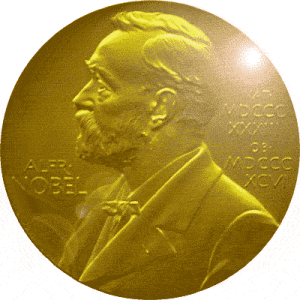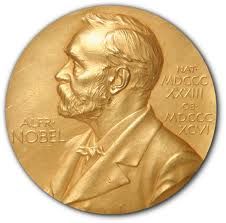
The Nobel Prize By the Numbers

But if you tried to play the odds this year and were rooting for Murakami or Roth, the numbers could have predicted you’d be disappointed.
Current average age of the Swedish Academy: 72
Nobel Prizes for Literature Awarded: 114
We talk about the Nobel Prize as if it’s an global award, but the Academy is made up of Europeans and its focus certainly seems to be on European writers.
Nobel Literature Laureates From Europe: 82 (72%)
The first 50 years of the prize are almost exclusively European, but any efforts to be a worldwide prize aren’t terribly effective.
Nobel Literature Laureates from Europe in the Last 20 Years: 12 (60%)
If you look at the population of the world, the most populous countries are China, India, and the United States. It was pretty much the same 100 years ago. And yet nearly 100 years past without a Chinese winner.
Chinese Nobel Literature Laureates: 2 (Awarded in 2000 and 2012.)
India is even worse. It’s been over a century since India won a Nobel Literature Prize.
Indian Nobel Literature Laureates: 1 (Awarded in 1913.)
America is doing better. And yet…
American Nobel Literature Laureates: 10
French Nobel Literature Laureates: 14 (Last awarded in 2014.)
Swedish Nobel Literature Laureates: 7 (Last awarded in 2011.)
Swedish Nobel Literature Laureates Who Were Also Members of the Swedish Academy Who Voted On Their Own Awards: 2
That’s only nationality, not even considering race and ethnicity.
African Nobel Literature Laureates: 4
For an entire continent, it’s terribly underrepresented. But it’s worse when you look at race.
White African Nobel Literature Laureates: 2
Black African Nobel Literature Laureates: 1
Arab African Nobel Literature Laureates: 1 (Also the only Arab period.)
Of North America’s Literature Laureates, all 7 winners up until 1962 were White. There has been some positive change, though. From 1967 to the present, of the 9 North American Laureates only 4 are White. 2 are Black, 2 are Latino, and 1 is Asian. (It can get fuzzy here, I’ve chosen to count V. S. Naipaul as being from Trinidad, though many count him as British.)
South American Nobel Literature Laureates: 4 (3.5%)
While South America has about half the population of Europe, Europe has over 20 times more Nobel Literature Laureates than South America.
Then there’s the gender issue.
Male Nobel Literature Laureates: 100 (87.7%)
The first woman to win a Nobel Prize for Literature did so in 1909, within the first decade it was awarded. After that it took 17 years for another woman to win in 1926. Even worse, between 1946 and 1990 (a period of over 40 years) only one woman won a Nobel Prize for Literature; Nelly Sachs, a German poet, won in 1966. And shared the award that year with a man.
In the last 20 years there’s been positive change, but not positive enough. Only 5 of the Nobel winners in the last 2 decades have been women, that’s only 25%.
None of this is to say that Nobel Laureates for Literature individually don’t deserve their prizes. There are many impressive and important writers around the world, and Nobel winners are talented and lauded. But the heavily white and European focus for the Nobel Prize for Literature says this isn’t really a modern prize. This is a prize that’s still living in the past, where the Canon is made up mostly of White European Male writers. 64% of prizewinners from over a century of prizes fall into that category.
If that’s the prize the Nobel wants to be, then we can let it do that.
But we need to stop looking to the Nobel as a truly global and diverse prize.

















